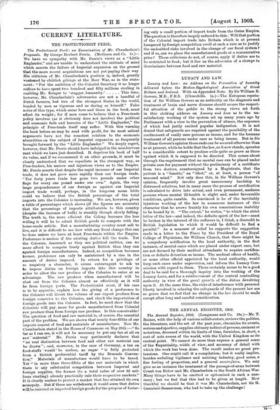LUNACY AND LAW.
Lunacy and Law : an Address on the Prevention of Insanity delivered before the Medico- Brlichol ogical Association of Great Britain and Ireland. With an Appended Note. By Sir William R. Gowers, M.D. F.R.S. (Churchills. ls.)—The Eifropean reputa- tion of Sir William Gowers as an authority on the diagnosis and treatment of brain and nerve diseases should secure the respect- ful attention of the public to the strong views set forth in this striking address on Lunacy and Law as to the un- satisfactory working of the system set up many years ago by Parliament with a view to the prevention of abuses, the exposure of which had justly excited popular indignation. It is not denied that safeguards are required against the possibility of the cor.fmement of really sane persons as insane, and for the humane treatment of all persons under care as being insane. But in Sir William Gowers's opinion those ends can be secured otherwise than as at present, while he holds that the law, as it now stands, operates to a considerable extent to produce evils quite as grave as those against which it is supposed to be directed. This comes about through the requirement that no mental case can be placed under private care for payment without the preliminary of a certificate from two doctors, countersigned by a Magistrate, that the patient is a "lunatic," an "idiot," or, at least, a person "of unsound mind." Not only does this, in Sir William Gowers's opinion, frequently involve great unnecessary hardship to distressed relatives, but in many cases the process of certification is calculated to drive into actual, and even permanent, madness persons whose mental ill-health is slight and, under favourable conditions, quite curable. So convinced is he of the inevitably injurious working of the law in numerous instances of thi3 character that he avows frankly his own conscientious inability to be bound by it. "The extent," he writes, "to which the strict letter of the law—and indeed, the definite spirit of the law—must be broken in the interest Of the sufferers is, I think, a discredit to British legislation to which it would be difficult to find a parallel." As a measure of relief he supports the suggestion made in a letter to the Times by the President of the Royal College of Physicians, Sir William Church, that there might be a compulsory notification to the local authority, in the first instance, of mental cases which are placed under expert care, but are not deemed by their medical attendants to require certifica- tion or definite detention as insane. The medical officer of health, or some other official appointed by the local authority, would keep such cases under supervision, and inform the Lunacy Com- mission with regard to them. There certainly seems to be a good deal to be said for a thorough inquiry into the working of the
Lunacy Laws, and for a reinforcement of the central controlling
authority in view of the great growth of the duties devolving upon it. At the same time, the risks of interference with personal liberty involved in relaxing the safeguards of the present law are so grave that we feel that no change in the law should be made except after long and careful consideration.






































 Previous page
Previous page